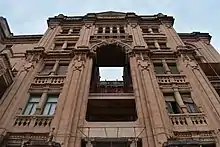St. Julian's, Malta
Saint Julian's (Maltese: San Ġiljan) is a town in the Central Region of Malta. As at 2020, its registered number of inhabitants were 13,792.[2] It is situated along the coast, north of the country's capital, Valletta. It is known for tourism-oriented businesses, such as hotels, restaurants and nightclubs which are centred mainly in an area known as Paceville.
Saint Julian's
San Ġiljan Il-Qaliet | |
|---|---|
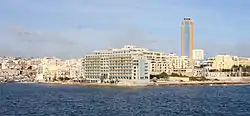 St. Julian's skyline in 2007 | |
 Flag .svg.png.webp) Coat of arms | |
| Motto(s): Għal kull bżonn (For every need) | |
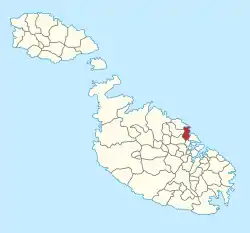 | |
| Coordinates: 35°55′7″N 14°29′24″E | |
| Country | |
| Region | Central Region |
| District | Northern Harbour District |
| Borders | Gżira, Pembroke, San Ġwann, Sliema, Swieqi |
| Government | |
| • Mayor | Albert Buttigieg[1] (PN) |
| Area | |
| • Total | 1.6 km2 (0.6 sq mi) |
| Population (Jan. 2019) | |
| • Total | 13,792 |
| • Density | 8,600/km2 (22,000/sq mi) |
| Demonym(s) | Ġiljaniż (m); Ġiljaniża (f), Ġiljaniżi (pl) |
| Time zone | UTC+1 (CET) |
| • Summer (DST) | UTC+2 (CEST) |
| Postal code | STJ |
| Dialing code | 356 |
| ISO 3166 code | MT-48 |
| Patron saint | St. Julian Our Lady of Mount Carmel |
| Day of festa | Last Sunday of August Last Sunday of July |
| Website | Official website |
Etymology, Feast and Traditions
The town is named after its patron saint; Saint Julian who is widely known as Julian the Hospitaller and Julian the Poor whereby he is the patron Saint of hunters.[3] Before the reform to the Calendar of Saints, the memorial to St Julian was on 27 January. Nowadays, it is celebrated on 12 February,[4] although in Malta an additional feast, in the spirit of the many summer feasts around the island, is celebrated on the last Sunday of August.[5]
A very particular competition connected with the town's feast is known as ‘ġostra’.[6] This traditional competitive feat involves participants climbing and running as far as possible along a sloping greased pole which is suspended above the sea. The winner is the person to grab one of three flags dangling from the edge, each flag representing a certain prize.[7]
Another tradition connected with the feast of this locality is 'Musketterija'. Starting in 1982, this tradition sees Hunters firing blank cartridges filled with black powder from the roof of the parish church as the statue of the patron saint is brought out of the church. Many say this tradition is in line with the history of the locality which used to be hunting grounds for the Knights of Malta.[7]
Locations and Areas
The town is subdivided into informal districts which are Paceville, Ta' Ġiorni, Tal-Għoqod and St Andrew's, as well as the regions surrounding St George's Bay, Spinola Bay, Balluta Bay, and Il-Qaliet cliffs. St Julian's is a tourist destination, especially during the summer months.
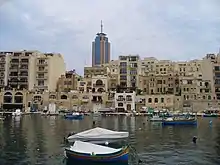
The Portomaso Business Tower, which is Malta's current tallest building at a height of 97.54 metres, is located in St. Julian's.[8]
The Old Parish Church
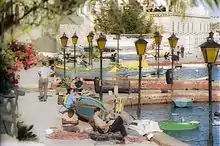
The earliest documentary evidence of this church is of the pastoral visit of Bishop Tommaso Gargallo of 1601, which he says was built in 1580 and was dedicated to Saint Julian. In 1736, when Monsignor Alpheran de Bussan re-visited Saint Julian's, he noted that the locality was already known as Portus Sancti Juliani, meaning after the patron saint. In 1854, the 600 or so residents of Saint Julian's appealed to the church authority, in order to make it a parish. The chapter at Birkirkara protested strongly against such an application and consequently the application was denied; but it was granted at reapplication in 1891. Dun Guzepp Scerri became the first parish priest.[9]
The present parish church was designed by Maltese architect Arturo Zammit and its first stone was laid in 1961. It was used for the first time in 1968 when it was still not fully built.[10] The church welcomed Pope St. John Paul II on his first visit to Malta on 27 May 1990.[11]
The Millenium Chapel designed by Maltese architect Richard England was inaugurated in 2000. It houses a meditation garden inaugurated in May 2018 as a refuge for contemplation and tranquility right in the heart of the entertainment Zone of Pacevile[12] Built on the initiative and run by Fr Hilary Tagliaferro this church is run by Augustinian monks through the Millenium Chapel Foundation.[13]
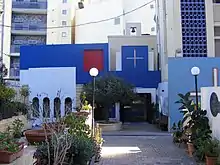
Up till the nineteenth and early twentieth century, St. Julians was a very peaceful coastal town known for its Latin architecture such as the Spinola Palace and greenery surrounding it. Moreover, Spinola bay was characterized by its fishermen and farmers dwelling the countryside.
This Coastal town has seen one of the largest infrastructure developments on the island with many old houses being demolished to construct blocks of apartments. In 2020 plans to develop a tourist Ferry point within Balluta Bay have been met with public concern and protests by individuals, Local Council and Ngos.[14]
Spinola Palace
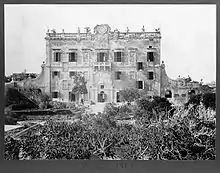
Because of fear of attacks by the Muslims, the Northern Coastal area remained undeveloped until the diminished attacks after 1565. The building of Spinola Palace, coming as it does in 1688, is to be regarded as the stepping stone for the coastal reclamation of San Ġiljan. The palace, together with the surrounding gardens, was built by Fra Paolo Raffaele Spinola for the public entertainment as stated in the inscription which one finds above the portico. The palace was enlarged in 1733 through the efforts of Fra Giovanni Battista Spinola, successor to his uncle as rector and Curator of the Abbazia.[15] During the French occupation of these islands in 1798, St Julians was the first town in Malta to be conquered by French troops. In fact it was General Claude Henri Vaubois who led the French forces into Spinola bay.
Notable places in St. Julian's
Notable Places and Locations
- Balluta Builidings
- Dragonara Point
- Il-Qaliet
- Paceville
- Portomaso
- Ta' Giorni
- Villa Rosa
- Wied Ħarq Ħamiem
- Wied tal-Balluta
- Love Statue by Richard England[16]
- Villa Leoni
- Villa Priuli
- Villa Blanche
- Villa Cassar Torreggiani
- St. George's Bay Tower
- Monument of Ċensu Tabone
Religious Monuments & Churches
- Statue of St. Julians in Triq il-Kbira
- Statue of the Sacred Heart of Jesus in Xatt ta' Spinola
- Church of the Immaculate Conception in Triq San Gorg
- Statue of the Assumption in Triq Lapsi
- Niche of the Immaculate Conception in Telgha ta' Birkirkara
- Church of the Madonne of Good Council in Triq il-Knisja
- Church of Santa Rita
- Millenium Chapel
- Poor Clares' Monastery
- Carmelite Convent
- Convent of the Sacred Heart of Jesus School
Local Council
The Local Council is presently made up of the following members:[17]
Albert Buttigieg (Mayor)
Clayton Luke Mula (Deputy Mayor)
John Agius
Patricia Camilleri
Guido Dalli
Rita Dimech Portelli
Adrian Dominic Ellul
Sean Gauci
Martin John Sultan
Paul Spiteri (Executive Secretary)
Notable events
.jpg.webp)
- The St Julian's feast is always held on the last sunday of August.
- The Battle of Malta Poker Tournament
Sports
St. Julian's is represented by the football team Melita F.C., formed in 1933. Their greatest honour in Maltese football to date is their 4–0 victory over neighbours Sliema Wanderers in the Maltese Cup final in 1939. In recent years, Melita have also competed in the Maltese Premier League and presently compete in the 3rd tier of Maltese football in the newly formed National Amateur League.
Waterpolo is the sport that brings people to this town. Neptunes WPSC, the local Waterpolo team has been in the top of Maltese Waterpolo league tables since it was established in 1929.[18] The club enjoys well equipped training facilities situated along the beach front.[19] Nearby San Giljan A.S.C has also been a strong player on the local scene with consecutive title wins as well as winners of the league in 2015.
Squash is also a common sport to play in St. Julian's.
See also
References
- "Councils Election". Electoral Commission Malta. Electoral Commission Malta. Retrieved 19 April 2015.
- "St. Julian The Hospitaller". www.catholicnewsagency.com. Retrieved 17 October 2018.
- Online, Catholic. "St. Julian - Saints & Angels - Catholic Online". Catholic Online. Retrieved 17 October 2018.
- "5 Facts You Didn't Know About St Julian's". Reveal Malta. 30 October 2017. Retrieved 21 August 2020.
- "What is the traditional game Il-Gostra?". Air Malta Blog. 17 October 2019. Retrieved 21 August 2020.
- "St Julian's feast celebrated with gostra and hunting traditions". Times of Malta. 30 August 2015. Retrieved 21 August 2020.
- "Portomaso Business Tower". Emporis. Archived from the original on 22 February 2015.
- "Storja | Parroċċa San Ġiljan". www.stjuliansparish.org. Retrieved 31 August 2020.
- Cassar, George (2019). A Taste of the History, Culture and Environment of the Central Region of Malta. Malta: Kite Group. p. 69. ISBN 9789995750671.
- "To the representatives of Malta's scientific, cultural and artistic life at St. Julien Church in Sliema (May 27, 1990) | John Paul II". www.vatican.va. Retrieved 21 August 2020.
- "President inaugurates meditation garden at Millennium Chapel - The Malta Independent". www.independent.com.mt. Retrieved 21 August 2020.
- "Watch: Meditation garden to open at Paceville's Millennium Chapel". Times of Malta. Retrieved 21 August 2020.
- Castillo, Eric. ""Stop hogging our seas" Balluta Bay objectors tell Fortina ferry group". movimentgraffitti.org. Retrieved 21 August 2020.
- "Spinola Palace - St. Julians". restoration.gov.mt. Retrieved 31 August 2020.
- "The love statue in Saint Julians | HeartOfMalta.com". www.heartofmalta.com. Retrieved 21 August 2020.
- "Mayor and Councillors". localgovernment.gov.mt (in Maltese). Retrieved 31 August 2020.
- "Neptunes WPSC » Club Honours". neptuneswpsc.com. Retrieved 31 August 2020.
- "Neptunes Water polo & Swimming, Malta sports facilities". www.malta.com. Retrieved 21 August 2020.
External links
| Wikimedia Commons has media related to St. Julian's. |
- St Julian's local council English language homepage of St Julian's local council
- List of monuments in St. Julian's
- Neptumes WPC website
- San Giljan Waterpolo Club website
- St Julians Local Council
